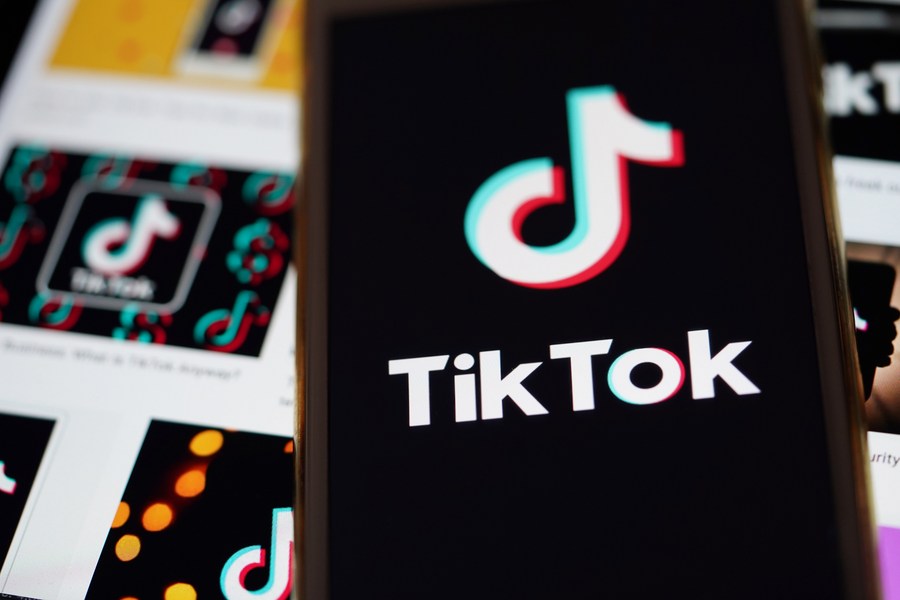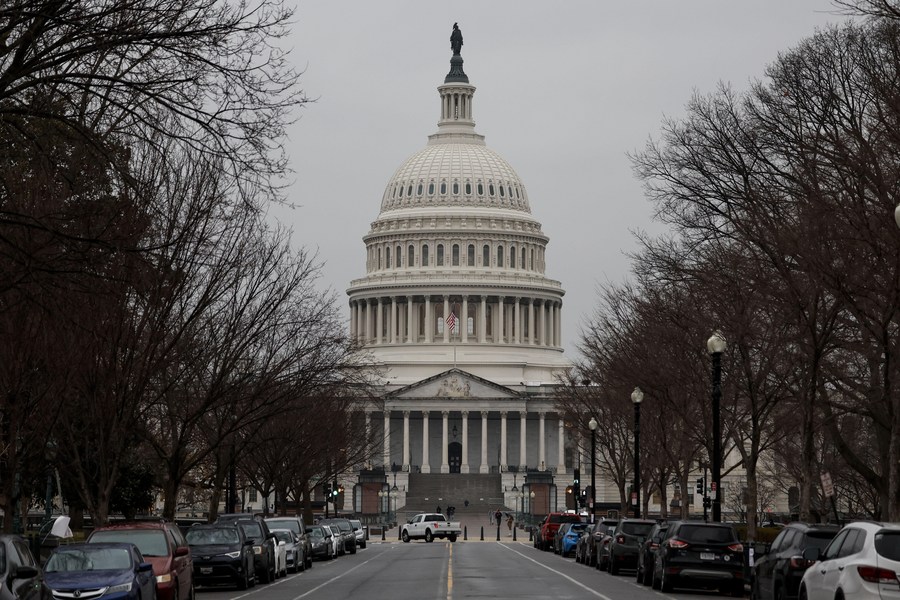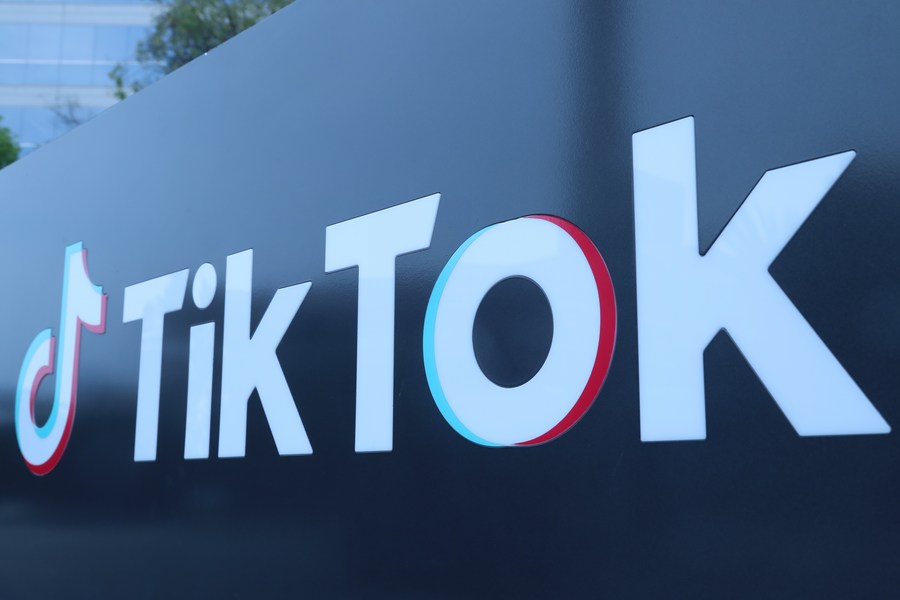U.S. users defend TikTok, mock lawmakers' hysteria as company's CEO grilled during marathon hearing
WASHINGTON, March 26 (Xinhua) -- U.S. lawmakers early this week enacted a heinous political stunt to portray TikTok, a video-sharing social networking company, as a national security threat.
The nearly six-hour congressional grilling of TikTok CEO Shou Zi Chew left one wondering what the point of the hearing was other than to expose the incompetence of some congressional members.
Despite the congressional grilling, TikTok received unwavering support from its myriad U.S. users, who defended TikTok's innocence, expressed their support and mocked the lawmakers' hysteria and ignorance at the hearing.

The logo of TikTok is seen on the screen of a smartphone in Arlington, Virginia, the United States, Aug. 30, 2020. (Xinhua/Liu Jie)
POLITICAL HYSTERIA
Lasting for nearly six hours, Thursday's hearing by the House Committee on Energy and Commerce centered on data privacy and child protection, about which Chew presented the committee's bipartisan members with steps TikTok has been taking to address the associated risks that are of concern.
Throughout the hearing, the lawmakers neither cared about nor believed in the explanation by Chew. Instead, they were blindly focused on hammering home the message that TikTok is a threat to data privacy of 150 million American users and national security.
Lacking evidence, the only excuse by which the lawmakers singled out TikTok as the must-be-banned app is that its parent company, ByteDance, operates in China. Ignoring that ByteDance is a private business, the lawmakers remain fixed on the untenable logic that companies operating in China must heed directives from the Chinese government.
The congressmen couldn't tolerate any further explanation from Chew beyond "yes" or "no" to their fishy questions. Perhaps they feared that giving Chew one opportunity to get into details would undercut the message they tried to convey to the public, and expose their hypocrisy to those watching from every corner of the world.
One stark example was when the committee's chair, Republican Congresswoman Cathy Rogers representing the state of Washington, goaded Chew to admit that ByteDance and TikTok used certain tactics to "spy" on Americans.
In his response, Chew challenged Rogers' characterization of spying, but he was immediately interrupted by Rogers, who almost lost her temper when saying "I want to hear you say with 100 percent certainty" that TikTok will not engage in surveillance activities against Americans.
Denying Chew the chance to make further statements because otherwise she wouldn't have enough time to make her own, which she was keen to spread, Rogers rushed to conclude that TikTok is a "weapon" against Americans.
Similar interruptions happened numerous times during the subsequent rounds of exchanges between Chew and other committee members. The committee asked questions to which they already had answers not because they are curious about how TikTok would handle the issues of concern. They simply wanted Chew to concur with their judgments -- most of which, unfortunately, are subjective and fanciful.
The U.S. government has forced TikTok to split off from ByteDance and be acquired by an American company, otherwise it would face a nationwide ban.
Asked at the hearing whether his company would comply with the divestment requirement, Chew told the lawmakers that ownership was not the issue. "With a lot of respect: American social companies don't have a great record with privacy and data security. I mean, look at Facebook and Cambridge Analytica," he said, referring to the revelation in 2018 that Facebook's user data has long been secretly gathered by a British political consulting firm.
That scandal similarly triggered intense congressional investigation, involving testimony by Facebook CEO Mark Zuckerberg before both the House and the Senate.

This photo taken on Jan. 19, 2023 shows the U.S. Capitol building in Washington, D.C., the United States. (Photo by Ting Shen/Xinhua)
While the committee dismissed Chew's explanation of the universal lack of protection of data privacy across the U.S. tech industry, The Washington Post found Chew's point not only valid, but also worth those uproarious lawmakers' introspection.
"At a hearing in which TikTok was often portrayed as a singular, untenable threat to Americans' online privacy, it would have been easy to forget that the country's online privacy problems run far deeper than any single app. And the people most responsible for failing to safeguard Americans' data, arguably, are American lawmakers," The Post said.
"But the compromises required to pass big legislation can be politically costly, while railing against TikTok costs nothing," the report said.
PUBLIC SUPPORT
TikTok users across the United States didn't buy their congressional representatives' browbeating of their beloved app. Following the hearing, one content creator posting on TikTok by the handle of "@notnotnotrekcut_" described the hearing as "awful" and a "hot garbage."
He said in another video that since he has learned so much from TikTok, ranging from health tips to wealth management skills, he's not going back to other social media platforms he once used. "I'm on TikTok's side through and through!"
Beneath the videos posted by Chew, whose account's user name goes as "@shou.time," there are countless comments from TikTok users in support of the CEO and the app. One comment read: "Regardless of the outcome, thank you for creating such a platform for the world. The interconnectedness you gave us will not be forgotten."
Another message under a separate video by Chew said, "I apologize for USA congress. You are amazing."
On Tuesday, some 30 TikTok users held a rally outside the U.S. Capitol, demanding that the U.S. government continue to allow the use of TikTok by the American public, because their art creations, education, expression of views, and so much more by which they make a living depends on and thrives alongside the platform. They later met lawmakers and held a news conference with Jamaal Bowman, Democratic congressman representing New York.
"Why the hysteria and the panic and the targeting of TikTok?" Bowman asked behind a podium adorned with a "Keep TikTok" sign. "Let's not marginalize and target TikTok," he said, before noting that the national security risks TikTok was accused of posing are shared by famous American platforms, including Facebook, Instagram, Youtube and Twitter.
Bowman said instead of a "dishonest conversation" urging a ban on TikTok, what lawmakers really ought to do is having a "comprehensive conversation" about broader legislative efforts to protect online data, so that social media users' safety and security is guaranteed.
"You can ban TikTok," he said, but that wouldn't at all prevent "data brokers" from selling social media user data without the knowledge and consent of the users.

This photo taken on Aug. 21, 2020 shows a logo of TikTok's Los Angeles Office in Culver City, Los Angeles County, the United States. (Xinhua)
Asked at a regular press briefing Friday to comment on Chew's testimony, Chinese Foreign Ministry spokesperson Mao Ning said: "The U.S. government has provided no evidence or proof that TikTok threatens U.S. national security, yet it has repeatedly suppressed and attacked the company based on the presumption of guilt."
"The United States should earnestly respect the principles of market economy and fair competition, stop suppressing foreign companies and provide an open, fair, just and non-discriminatory environment for foreign companies operating in the country."
Experts argued that if the Joe Biden administration moved to ban TikTok nationwide, such an executive order would almost certainly be challenged by those opposing it, citing the measure's violation of U.S. citizen's First Amendment right to freedom of speech.
There was a recent precedent: a TikTok ban issued by then-President Donald Trump in 2020 was met with multiple lawsuits and ultimately blocked by a U.S. federal judge, who ruled that the International Emergency Economic Powers Act that the ban relied on was inapplicable in the case, because the ban will effectively restrict the free flow of information.
"The law says whatever Biden would do can't impede the flow of information," William Reinsch of the Center of Strategic and International Studies, a Washington-based think tank, was quoted by the Post as saying. Reinsch is also a former U.S. Commerce Department official.
Citing a person with knowledge, the Post reported that Biden administration officials do not think they have the legal authority to ban TikTok without an act of Congress.
Photos
Related Stories
Copyright © 2023 People's Daily Online. All Rights Reserved.









